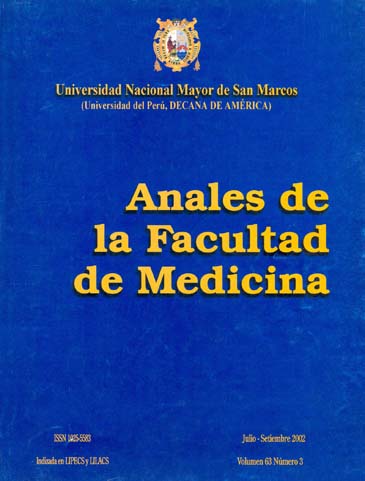Health human resources in the andean area: situation and challenges at the beginning of the 2000s
DOI:
https://doi.org/10.15381/anales.v63i3.1501Keywords:
Health menpower, public health, developing countriesAbstract
The article presents a review of the current situation and challenges in the field of health human resources at five Andean countries: Bolivia, Colombia, Ecuador, Peru and Venezuela. The article makes a transversal review of common problems in the Andean area, based on studies per countries summarised in the initial chapter of the report, which has not been published here. The study was performed between August and November 2000, based on secondary sources and consultation with experts in the subject from the five Andean countries. The conclusion is that the Andean countries are arriving to a very initial transition stage to the new human resources situation defined by sector reforms postulates. We can distinguish three situations on human resources: a) a situation of advanced labour flexibility, within a systematic change (Colombia); b) an opposite situation, countries with a very slow reform changes assimilation, the previous model persists and the union resistance to the changes is very strong (Ecuador, Bolivia and Venezuela), and c) a sui generis situation: labour regime fragmentation, decreasing appointments and increasing contracts, the managerial model enters strongly and the presence of the medical union is important with influence in the human resources area (Peru). A description of eight pending matters is provided: 1) the passage from the low availability to the oversupply at urban level; 2) the unsolved challenge of the new labour regime, in transition from appointments to contracts; 3) the salary impoverishment, the double salary regime using cooperation projects and the required reinvention of the public career; 4) the hard balance between costs and quality with the displacement from the clinical art to the managerial medicine; 5) the paradoxical reduction of the labour market and the increasing educational demand, underlining qualified training and accreditation; 6) the transit from the classic university training to the continuous and permanent education and the professional re-certification; 7) the health area pedagogical renewal, including new educational approaches; and 8) the human resources area transit from weak regulation to deregulation, and consequent governability processes weakening that affects more directly to the health area human resources.Downloads
Published
2002-09-16
Issue
Section
Revisiones
License
Copyright (c) 2002 JUAN ARROYO

This work is licensed under a Creative Commons Attribution-NonCommercial-ShareAlike 4.0 International License.
Those authors who have publications with this magazine accept the following terms:
- Authors will retain their copyrights and guarantee the journal the right of first publication of their work, which will be simultaneously subject to Creative Commons Attribution License that allows third parties to share the work as long as its author and its first publication this magazine are indicated.
- Authors may adopt other non-exclusive licensing agreements for the distribution of the version of the published work (eg, deposit it in an institutional electronic file or publish it in a monographic volume) provided that the initial publication in this magazine is indicated.
- Authors are allowed and recommended to disseminate their work over the Internet (eg: in institutional telematic archives or on their website) before and during the submission process, which It can produce interesting exchanges and increase quotes from the published work. (See El efecto del acceso abierto ).
How to Cite
1.
Arroyo J. Health human resources in the andean area: situation and challenges at the beginning of the 2000s. An Fac med [Internet]. 2002 Sep. 16 [cited 2025 Jun. 17];63(3):212-2. Available from: https://revistasinvestigacion.unmsm.edu.pe/index.php/anales/article/view/1501



